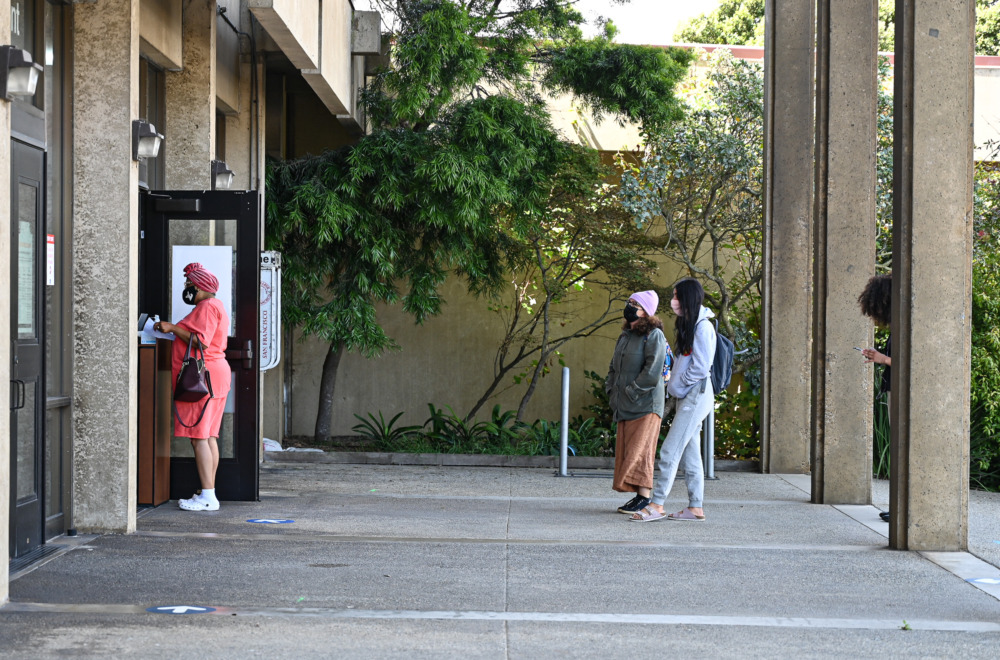Tempers Run High While Maneuvering a Vaccine Mandate
By Angela Greco
The past 18 months have been a tortuous whirlwind for City College, but with the FDA approval of the Pfizer vaccine, administration seemed to finally reach grounds for resolution unveiling a new “safety campaign.” The administration now seeks to hammer down the specific details of implementing these protocols in order to have a cohesive plan in place for the Spring semester.
These protocols include testing, contact tracing, and ensuring proper ventilation of classrooms is up to The Division of Occupational Health and Safety (Cal/OSHA) regulations, which aims to protect and improve the health and safety of those working in California.
Policy Requests
Per an Aug. 16 press conference – a day that coincided with the first day of instruction although only 28% of classes were actually operating in person – The Higher Education Action Team (HEAT) called on the City College Board of Trustees and Administration to administer two policies moving forward.
First, they called for all those on campus to require proof of vaccination, or a doctor’s note of exemption. Any of those exceptions were asked to show proof of regular testing for COVID-19.
Second, they asked the administration to prove that all buildings being used have proper airflow, ventilation, and are continuously and properly cleaned; these standards being based on the guidelines of the Center for Disease Control and Prevention (CDC).
Director of Media, Government Relations and Marketing, Rosie Zepeda said that the administration is closely following the guidelines of the CDC when it comes to carrying out the regulations of the mandate. She said that a walk through of the campus had recently been conducted by Cal/OSHA.
All classes are expected to make a full return for in-person come Spring semester of next year. However Zepeda said that some buildings including Bateman Hall, will most likely not be conducting classes until they are up to snuff mostly due to their lack of windows and poor air ventilation.
To help offset these obstacles City College received over $50 million in COVID relief funds including access to $845 million in facilities bond funds. With that in mind, money should not be an issue in ensuring buildings are up to code while implementing these safety protocols.

Guardsman.
“Safety Campaign”
Interim Chancellor Dianna Gonzales stressed that the health and safety of students and employees is their top priority, this being reason for a newly implemented “safety campaign.”
Zepeda said that while this campaign reflects the vaccine mandate, it will also “provide information regarding testing, the two allowable exemptions, and other resources to get us all safely through this pandemic.” The two allowable exemptions have yet to be released.
Political Science Instructor and HEAT board member Rick Baum pointed out that sorting the details is not only imperative for the safety of City College’s staff and students, but for the safety of the community as a whole.
In regards to any possible opposition to the mandate, Baum said that those unvaccinated “should be able to enroll, but must keep a safe distance from everyone.”
During a Board of Trustees meeting on Aug. 26, HEAT board member John Rizzo again stressed that “what we’re doing here is not just for this semester, but for the long haul as well to keep everyone safe.”

Applying Protocols
When it came to actual implementation, Administrative Vice Chancellor Tom Boegel said that the newly drafted administrative procedure would “call for students to either submit proof of vaccination status or submit their request for an exemption and be granted that exemption prior to registering for or attending any class.”
Although Boegel stressed vaccine requirements for students planning to enroll in classes that will be in person, he also said that they will not stop registration for students that have yet to submit their vaccine information. Instead he said, “Our intent is to handle this on a section by section basis.”
Zepeda showed support to this notion as well when she said, “our approach is not prescriptive at this time and more focused on considering all safety measures for students and employees.”
For those exempt from vaccination, a possible resolution could be calling for regular testing regimes. The CDC stated that those vaccinated can still carry and spread the virus, supporting the importance of carrying out the double pronged notion of not only requiring vaccinations, but following proper safety standards.
When asked if he thought student enrollment might continue to drop due to the coming restrictions, Baum instead asked, “Do people want to be in a classroom for up to three hours with others who are unvaccinated?”
During the Board of Trustees meeting, questions of low enrollment numbers and a possible contingency plan resurfaced but still no definitive resolutions were made.
Academic Senate President Simon Hanson said, “The challenge of instruction is not the numbers. What makes instruction is whether our students are inspired.” Then added, “It’s not going to be whether we just say we’re going to increase or decrease enrollment, and that requires support and unity and understanding.”
